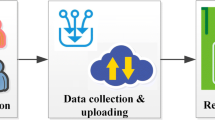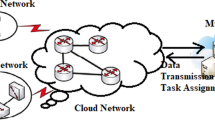Abstract
Participant selection or task allocation is a key issue in Mobile Crowdsensing (MCS) systems. Previous participant assignment approaches mainly focus on selecting a proper subset of users for MCS tasks, but however how to ensure that users devote effort on their tasks is a challenging problem that arises in these approaches. This paper studies the task quality control issue, and proposes a quality-validation task assignment mechanism (QTAM) in MCS systems. We theoretically model this mechanism as a Stackelberg Game, in which the users’ instinct of maximizing their payoff and the validation workforce limitation are taken into account. An efficient approximation algorithm is designed to find a Strong Stackelberg Equilibrium (SSE) in the QTAM game. Extensive simulations demonstrate the efficiency and effectiveness of QTAM, which shows that QTAM can prevent untrustworthy behaviors and achieve optimal quality validation for sensing tasks.
This work is supported by the National Natural Science Foundation of China (61672148, 61502092), the Ministry of Education - China Mobile Research Fund (MCM20160201), and the Hundred, Thousand and Ten Thousand Talents Project of Liaoning Province (201514).
Access this chapter
Tax calculation will be finalised at checkout
Purchases are for personal use only
Similar content being viewed by others
References
Guo, B., Wang, Z., Yu, Z., et al.: Mobile crowd sensing and computing: the review of an emerging human-powered sensing paradigm. ACM Comput. Surv. (CSUR) 48(1), 7 (2015)
Zheng, Z., Wu, F., Gao, X., et al.: A budget feasible incentive mechanism for weighted coverage maximization in mobile crowdsensing. IEEE Trans. Mob. Comput. 16(9), 2392–2407 (2017)
Peng, D., Wu, F., Chen, G.: Pay as how well you do: a quality based incentive mechanism for crowdsensing. In: Proceedings of the 16th ACM International Symposium on Mobile Ad Hoc Networking and Computing, pp. 177–186. ACM (2015)
Huang, K.L., Kanhere, S.S., Hu, W.: Are you contributing trustworthy data?: The case for a reputation system in participatory sensing. In: Proceedings of the 13th ACM International Conference on Modeling, Analysis, and Simulation of Wireless and Mobile Systems, pp. 14–22. ACM (2010)
Kang, Y., Miao, X., Liu, K., et al.: Quality-aware online task assignment in mobile crowdsourcing. In: 2015 IEEE 12th International Conference on Mobile Ad Hoc and Sensor Systems, MASS, pp. 127–135. IEEE (2015)
Pouryazdan, M., Kantarci, B., Soyata, T., et al.: Anchor-assisted and vote-based trustworthiness assurance in smart city crowdsensing. IEEE Access 4, 529–541 (2016)
Zhang, X., Xue, G., Yu, R., et al.: Keep your promise: mechanism design against free-riding and false-reporting in crowdsourcing. IEEE Internet Things J. 2(6), 562–572 (2015)
Kiekintveld, C., Jain, M., Tsai, J., et al.: Computing optimal randomized resource allocations for massive security games. In: Proceedings of The 8th International Conference on Autonomous Agents and Multiagent Systems-Volume 1, pp. 689–696. International Foundation for Autonomous Agents and Multiagent Systems (2009)
Jain, V., Grossmann, I.E.: Algorithms for hybrid MILP/CP models for a class of optimization problems. INFORMS J. Comput. 13(4), 258–276 (2001)
Author information
Authors and Affiliations
Corresponding author
Editor information
Editors and Affiliations
Rights and permissions
Copyright information
© 2018 Springer International Publishing AG, part of Springer Nature
About this paper
Cite this paper
Xia, X., Xue, L., Li, J., Yu, R. (2018). A Quality-Validation Task Assignment Mechanism in Mobile Crowdsensing Systems. In: Chellappan, S., Cheng, W., Li, W. (eds) Wireless Algorithms, Systems, and Applications. WASA 2018. Lecture Notes in Computer Science(), vol 10874. Springer, Cham. https://doi.org/10.1007/978-3-319-94268-1_68
Download citation
DOI: https://doi.org/10.1007/978-3-319-94268-1_68
Published:
Publisher Name: Springer, Cham
Print ISBN: 978-3-319-94267-4
Online ISBN: 978-3-319-94268-1
eBook Packages: Computer ScienceComputer Science (R0)




